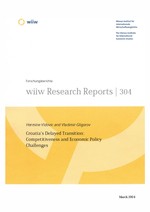Croatia's Delayed Transition: Competitiveness and Economic Policy Challenges
Vladimir Gligorov and Hermine Vidovic
wiiw Research Report No. 304, March 2004
48 pages including 27 Tables and 8 Figures
The report gives an overview of the overall trends in output and employment in Croatia, and of the country's fiscal and external sectors. It concentrates in more detail on the manufacturing sector and its competitiveness in comparison with developments in other Central, East and Southeast European economies. Finally some economic policy issues specific to Croatia are discussed.
The Croatian economy, hit hard by output declines in the 1990s, has not yet recovered to its pre-transition levels. In contrast to the largely successful stabilization of prices and the exchange rate, Croatia's external position has deteriorated considerably over recent years. Gross foreign indebtedness reached a record level in 2003, more than 80% of GDP. A positive role is played by the services sector: high surpluses are registered in services trade, and the sector has also a high proportion in the total FDI stock, primarily in the transport and telecom segment.
2002 manufacturing output reached only slightly more than 60% of its 1990 level; the single positive exception was the paper and printing industry. In comparison with the EU and the CEE countries, the output structure of Croatian manufacturing is more similar to the less advanced southern EU countries and also to Bulgaria and Romania. On the EU market Croatian manufacturing has been continuously losing export shares. As Croatia's trade deficit with the EU was growing, the deterioration was observable in most manufacturing branches, pointing to a widespread weakening of the country's international competitiveness.
As for exchange-rate and fiscal policies, if increasing risks to macroeconomic stability are to be avoided, a move towards a more flexible exchange rate may still be advisable in order to enhance industrial competitiveness and to allow for a more supportive monetary policy. Further fiscal adjustments would be needed to promote investment and thus increase employment.
Keywords: Croatia, manufacturing, foreign trade, FDI, foreign debt, fiscal deficits, economic policy
JEL classification: F14, F21, F34, L60, O57, P52
Countries covered: Croatia, SEE
Research Areas: Macroeconomic Analysis and Policy, International Trade, Competitiveness and FDI
